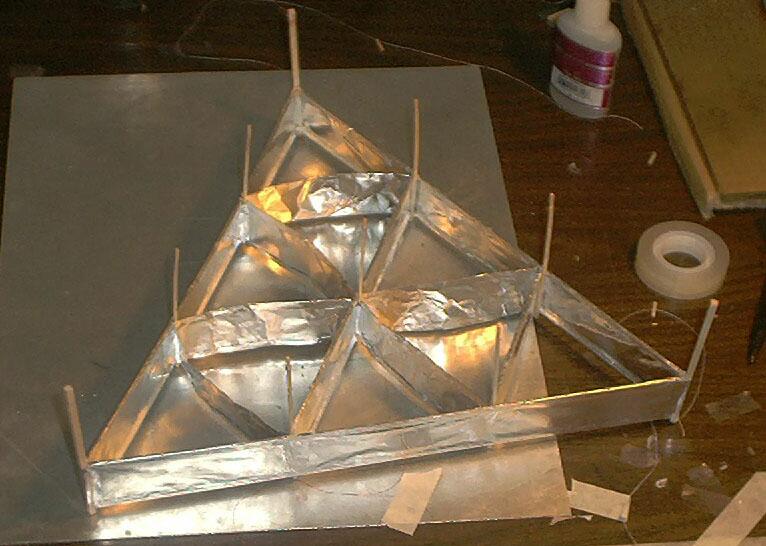
The
Lifters successful replications
Experimenters
Log Book
created
on October 10th, 2001- JLN Labs
All informations in this page are published free and
are intended for private/educational purposes and not for
commercial applications
Lifter replications Log Book : Previous Page - Next Page
|
|||||||||
| Envoyé via Internet | |||||||||
bonjour jean,
chris gupta: engr/antigravity researcher south florida launches
the 9 cell lifter
this measures 12"x12"x12" 1-1/2" space
between positive electrode (4mm) and negative side walls .i first
use copper wire and it barely lifted.
i purchased aluminum wire the smallest available #28 gage it blew
my over amp circuit. i was successful with #38 nichrome wire,lots
of thrust very quite.
i will post this on my website www.chrisgupta.com
keep up the good work jean,
i am planning larger versions.

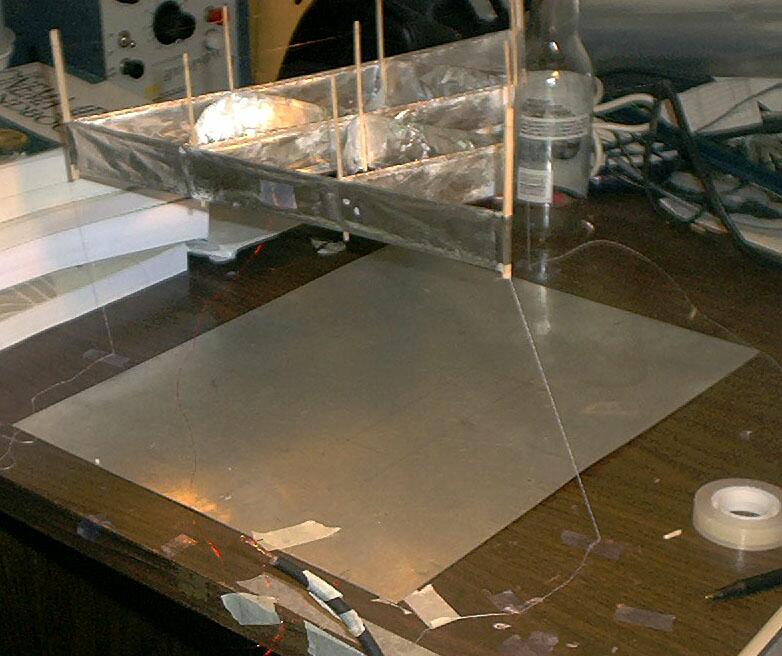
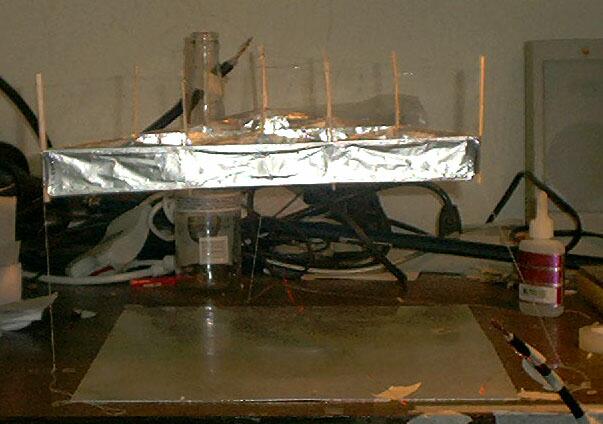
|
|||||||||
| Envoyé via Internet | |||||||||
Greeting from Spokane Washington, here is a picture of my
first Lifter.
I'm using a old Computer monitor for the HV supply. My lifter is
heavier than it needs to be as I used top and bottom struts for
the foil but it shoots as soon as I switch on the power. I found
that it has more lift when I use a 50gauge wire for the top
conductor, I also used it for the supply lines to the lifter.
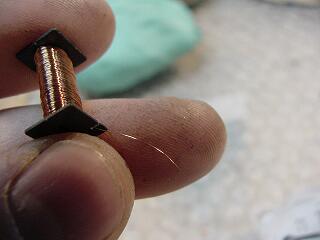
A good source for cheep mico size wire can be found inside the
cheep battery operated clocks like you would get a "dollar
store". I will post more pictures and mpeg video soon at my
web site, the Robot Hut. http://www.robothut.robotnut.com
John R.
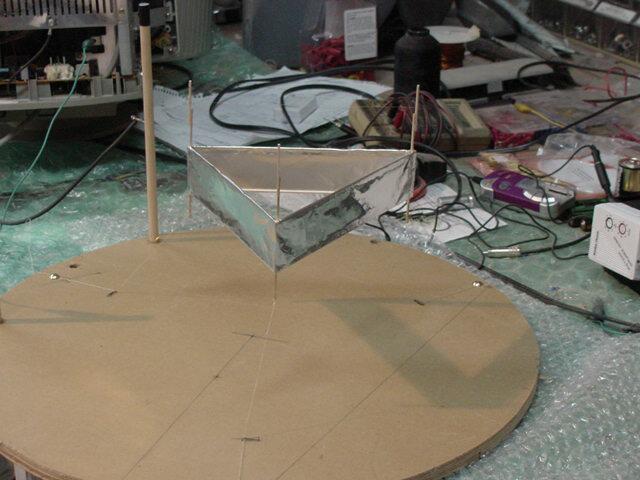
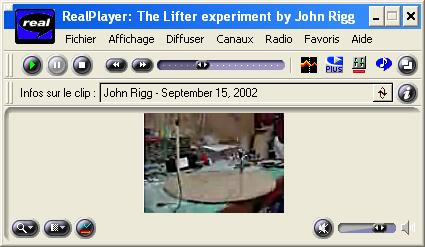
Click on the Picture above to see the Real Video ![]()
|
|||||||||
| Envoyé via Internet | |||||||||
Hi Jean-Louis,
Well everyone else has built a lifter so I built one this afternoon on the urging of a buddy of mine as he wanted to build a power supply for one.
It is simply 7" on sides, 3 " tall, single sticks at the top of the foil. Zap glue,Standard stuff, foil rounded over. Powered off a 15" color TV set. Weight about 0.09 oz. Very fine wire out of a zip cord. What can I say, it snaps to the top of the threads like a champ.
Thanks for all the info, it made it easy!
What Fun,
Ben K4ZEP
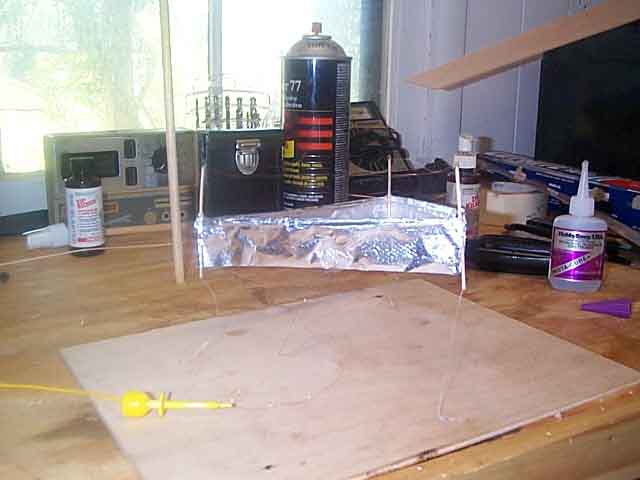
|
|||||||||
| Envoyé via Internet | |||||||||
Hello everyone,
I'd like to report yet ANOTHER successful lifter
replication, this time in Baltimore Maryland, USA! This is my
third lifter, and my most stable so far, using basic balsa, foil
and 32 ga uncoated stainless wire (found in a local hobby shop,
used for beading/jewelry). There is no appreciable corona, and it
is almost silent!
Great thanks goes to everyone involved making this an
"open source" reasearch project, in the spirit of the
pioneering inventors/researchers that most of our technologies
are based today. One almost forgets the lone toilers from which
many our greatest breakthroughs have come. And this seems to only
be the beginning!
The wonder in this world never ceases,
-Eric B. Serfass
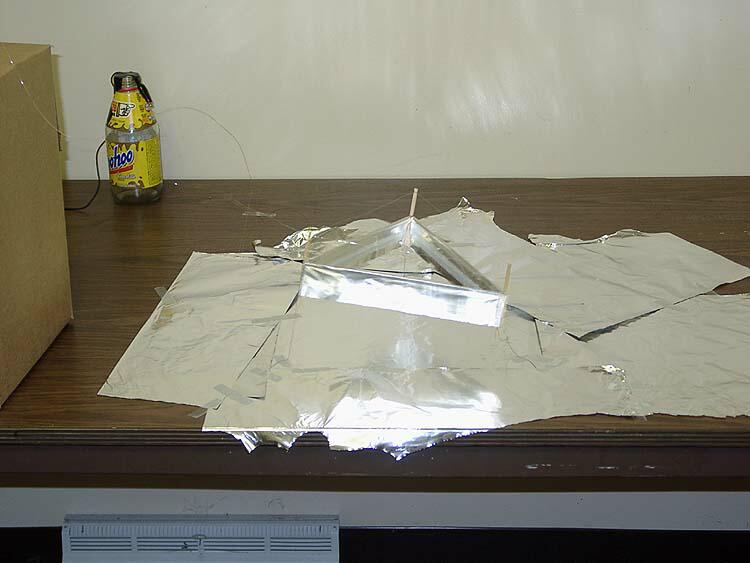
|
|||||||||
| Envoyé via Internet (afficher l'en-tête) | |||||||||
Hi Jean-Louis,
I am verry happy to send you a picture of my first Lifter 1
replica. After some fiddling around with the distance between the
copper wire and the alu foil, and the +30kV wire discharging to
the ground rather than to my lifter, it floats quite stable.
I put some more pix and descriptions on http://jerry.odee.net/www/lifters
Thank you for your excellent description of the lifter!
kind regards
Gjalt Reitsma
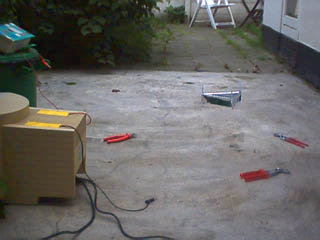
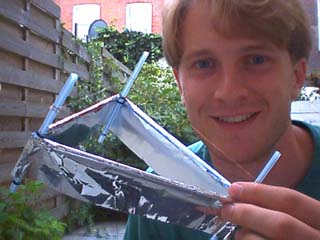
|
|||||||||
| Envoyé via Internet | |||||||||
Jean,
Read an article in janes defence
weekly on lifters and had to find out more. Went to your web
sight and used your instructions to build the lifter 1. Built it,
connected it to the HT on an old vga monitor and it flew, aprox
4" of the desk which was not what I expected.
Now totally hooked and am building an other larger craft.
Best regards Dave B.
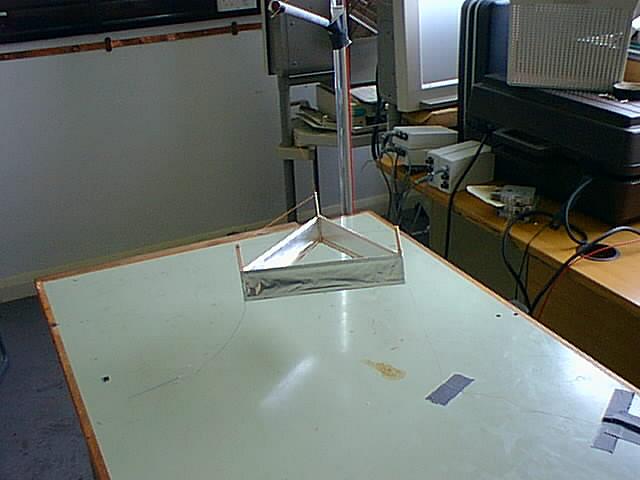
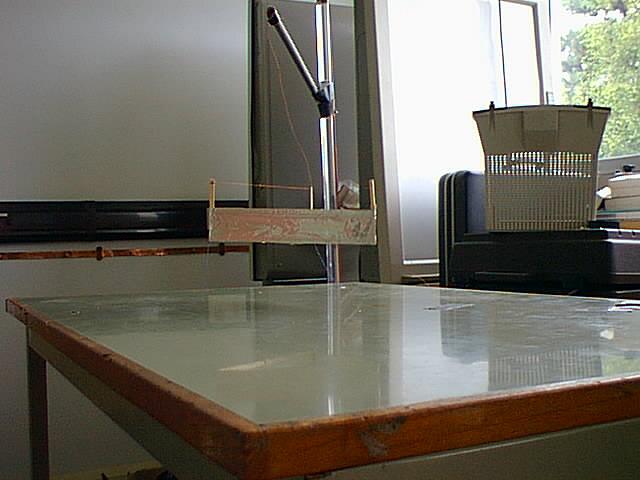
|
|||||||||
| Envoyé via Internet | |||||||||
Hi Jean,
only a day after the first documented Dutch lifter flight by my
colleague
Marcel van der Lee my second attempt at a lifter design made a
succesful
flight. I have put some documentation and films on
http://lifters.vlothuizen.nl/
Keep up the good work with your website,
Wouter Vlothuizen
(52 06' 34" N 04 19' 38" E)

|
|||||||||
| Envoyé via Internet | |||||||||
Hello,
It was the third lifter I built that I finally got to fly. It is 20cm each side and stands 14.5cm tall with 4cm of foil for the skirt. This is actually the second one I built but I modified it with the lower strut extensions and also removed the red coating from the corona wire. After I played with the height of the corona wire it finally took off!
I have to thank Carl Ramm who first showed me the lifter and for inspiring me to build it.
Thanks,
Dave March
Anchorage, Alaska USA
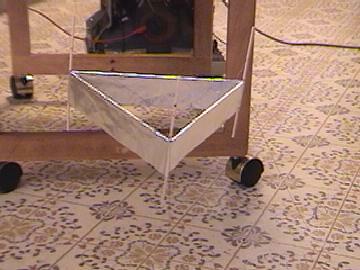
|
|||||||||
| Envoyé via Internet (afficher l'en-tête) | |||||||||
Hello Jean,
We are very pleased to send you the photograph of our replication
of your 'built-yourself- lifter. After some adjusting of the
distance between the plates and the wire in combination to the
voltage, the lifter worked fine.
Thanks for your superb website.
Regards,
--
Marcel van der Lee
Den Haag
The Netherlands
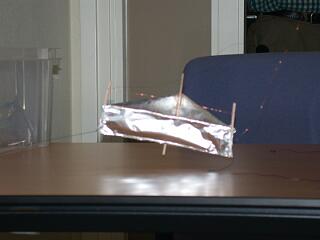
|
|||||||
| Envoyé via Internet | |||||||
Hi
My name is Stefán Rósinkrans Pálsson and I´m an Electric
& Computer Engeneering student in Iceland. I manged to make
my first lifter flight the August 20, 2002. Trouly a fantastic
flight were I could see the clow from the corona wire whe it was
dark.
Thanks fore a greate webside.
Regards
Stefan
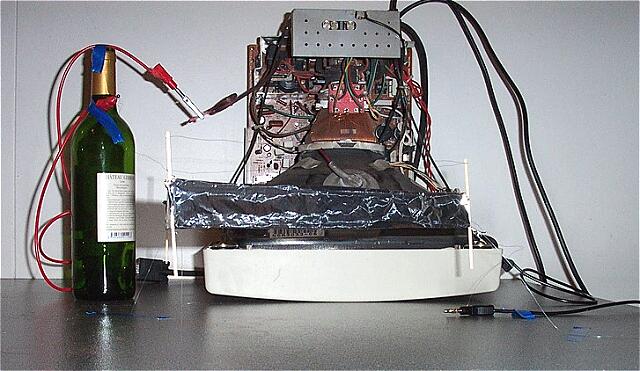
|
|||||||||
| Envoyé via Internet | |||||||||
Hi,
I based the design for this Lifter on your Lifter v1.0. This was
the third lifter I built to this design. At first It's lift was
weak so I progressively shortened the distance between the
aluminum plate and the corona wire from 70mm in 5mm intervals.
The lifter flew when I got to 45mm. In order to see if this was
caused by the reduction of weight I attached the bits of the
corona wire's support that I had removed. The Lifter still flew,
in fact I attached approximately twice the length of balsa back
onto the lifter and it still flew. The other dimensions were as
per v1.0 but The foil support followed the design of your
Lifter1. I then revised my other lifters and found that a similar
reduction of the size of the supports increased their lift (they
did not fly well because they were also much heavier). This
suggests that the distance between the plate and the corona wire
is not as predicted by Michael Couch and Evgenij Barsoukov's
theory however this is not conclusive as other factors such as
the conductivity of the support materials may and the power of
the supply may be different. Another Lifter I built was entirely
made from polystyrene and this one required an even smaller gap.
p.s. Thank you for the lifter, It's pretty wonderful when you
first see one take of.
Cheers
Peter.
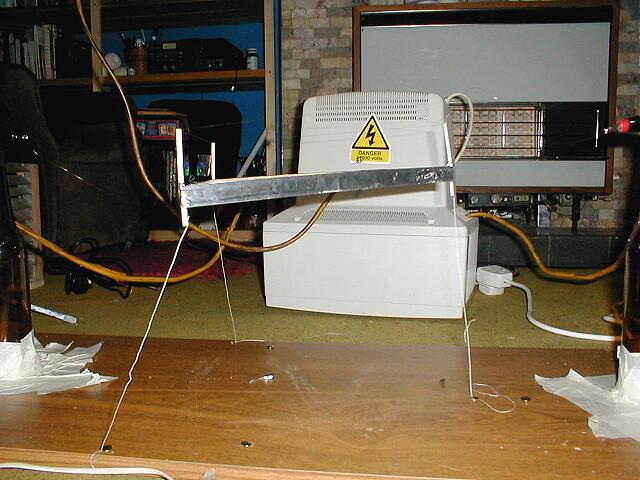
|
|||||||||
| Envoyé via Internet | |||||||||
jean
chris gupta/ electronic engineer. i take great pleasure to inform
you of another success from florida.
my basic lifter 6"x6"x6" positive at 2" from
negative foil.
with 30kv at 1.5ma it just lifted about 50mm and moved around.
with a 30kv at 5ma it went straight up .
i will soon post more info on my web site
http://www.chrisgupta.com
i am working on the gravity capacitor.\\
i have die cut hard tempered aluminum plates 8' diameter
nine segments,the dielectric mylar 10'diameter also die cut.
air screen 9'diameter,three versions to be tested.
i will keep you informed
chris
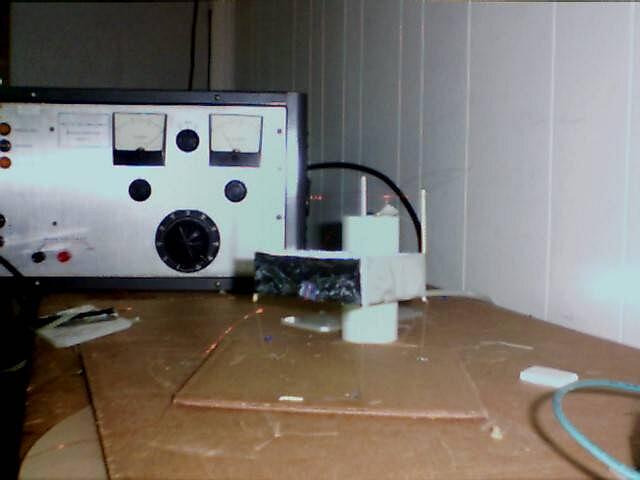
|
|||||||||||
Hello Jean,
Just like to thank you for the great site and all the useful information contained within. A few of my friends and I were able to successfully recreate the lifter version 1. We have put some of the media up on our own website so I’ll just provide you the link to it : www.caduceonlabs.com/~lifters/
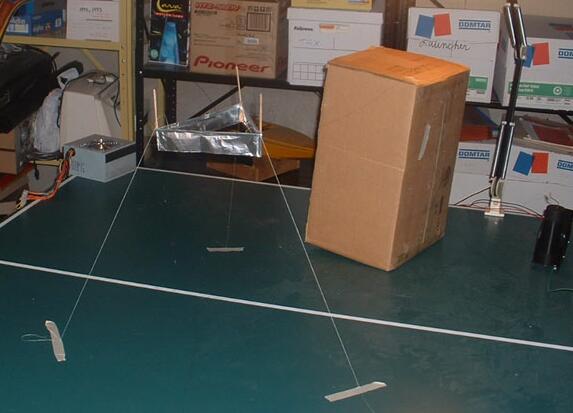
To our delight, the thing worked right off the bat! We were expecting it to go up in a ball of flames. We are using the GRA series power supply, providing 20,000 volts @ 1ma. We have to date also replicated the lifter version 2 and tested it. We don’t have that media up on the website yet, but it’ll be up there shortly.
I am attending University this fall, and it is my intent, and of course, time willing, to found a 'Lifters Club' at the school. Hopefully we'll be able to conduct some of the more advanced experiments that require expensive machinery, such as tests in a very solid vacuum. Should the group be created, I'll make sure to publish all our findings on the web as well. We also have successfully conducted an outdoor test of the lifter version 2. We hope to have some of that media up soon as well.
Thanks again for the great website!
Regards,
Tim Ziebell in Ottawa, Ontario, Canada
|
8/13/2002
6:00 P.M. Eastern standard time
St.Petersburg, Florida
Greetings,
I have just had my first successful lifter flight. I used
information from fellow Arc and Sparkers in the group.
I came up with my own design. It is a circular shape with a 100mm diameter, 50mm foil, and 30 guage nichrome wire on foam struts for the emitter at 50mm above the foil. I ran my converted flyback off of a Mac SE power supply using the +12vdc and -12VDC leads for 24VDC output. I ran a nylon line from the launch surface to the ceiling as a guide line. The first flight reached 80mm and the second near 150mm. The only height limiting factor was the length of the HV leads. I will have video of the flight when I get a chance to convert it.
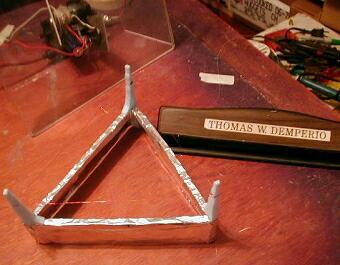
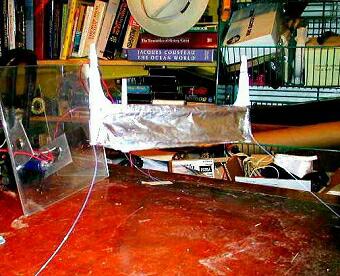
Also attached is a picture of my half sphere craft that shows a 50% increase in output Ion wind/Ether wind...
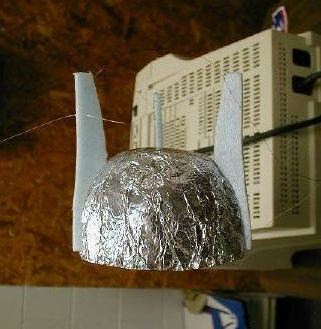
Thanks for the inspiration and information...
Thomas W. Demperio St.Petersburg, Florida
Bangyourdrums@yahoo.com
Visit my homepage at: http://members.tripod.com/~bangyourdrums/antigravity.html
Bizarre is what we are...Unique is what we seek...
Thomas W. Demperio
|
|||||||||||
First of all, I must thank you for this
website- and this technology- as antigravity has been a lifelong
dream of mine; albeit slowed by unattainable & expensive
technology. You have shown everyone how to defy gravity with
simple household items!
I built four lifters, all but ELT 2.3 were made with 4x5mm slices
of balsa, and ELT 2.3 was made with 2x3mm balsa:
ELT 2.0 - Lifter 1 Style [120mm X 75mm] - Modified w/straws for
adjustable wire distance. Too Heavy To Lift off, but produces
noticable thrust when suspended. Heavy foils, straws, wood glue,
epoxy, cyanoacrylate, tape; WAYYY to heavy!
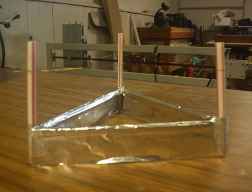
ELT 2.1 - Lifter 1 Style [120mm X 75mm] - No straws, lightweight
foils, lift off! Only hovers at around 40-50mm.
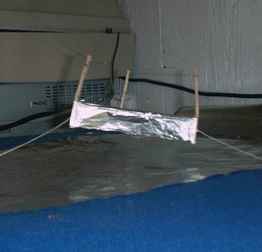
ELT 2.2 - Lifter Basic Style [200mm X 100mm] - A bit larger,
light foils, no lower support. Very good lift, but only hovers
around 30-40mm
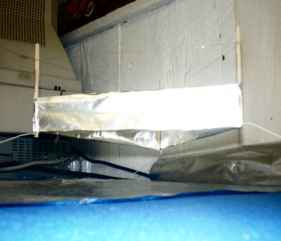
ELT 2.3 - Custom Lifter [100mm X 50mm+25mm extensions] - Lifts
quite well, 50-60mm hover. Originally vertical struts were 50mm,
but due to arcing they had to be extended. Still works well!
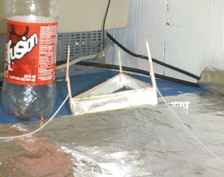
I guess because of workmanship the thrust is quite unequal on
each side, and for some reason- no matter how slack the tethers
are- the lifters dont hover very high. I guess my power supply is
too weak [Old Macintosh "Multiscan-15" Monitor], so I
am working on building a 40KV Ignition Coil supply. My lab is
also in a basement, so humidity may also have an effect.
Before ELT 2.0, I built a few variants on the Lifter principle,
using straws, q-tips, and pvc tube. All were used to measure
suspended thrust, of course, and they worked very well! More
pictures and a website soon.
Like 'Howard B', all my lifters are built with the positive
electrode as the wire. Seems to work best this way? Also,
grounding the work surface is a MUST, I used aluminum foil
connected to ground. [No arcing because bottom foil is Neg.]
So, I cannot thank you, and all the otehr hobbyists around the
world, enough for bringing this technology into public view! I
will help further this technology as much as I can!
Mica Busch (Michigan, USA)
Link to the Mica Bush web site : http://www.nmo.net/~busch/edunltd/lifters.html
Lifter replications Log Book : Previous Page - Next Page
Return to the Lifters Builders page